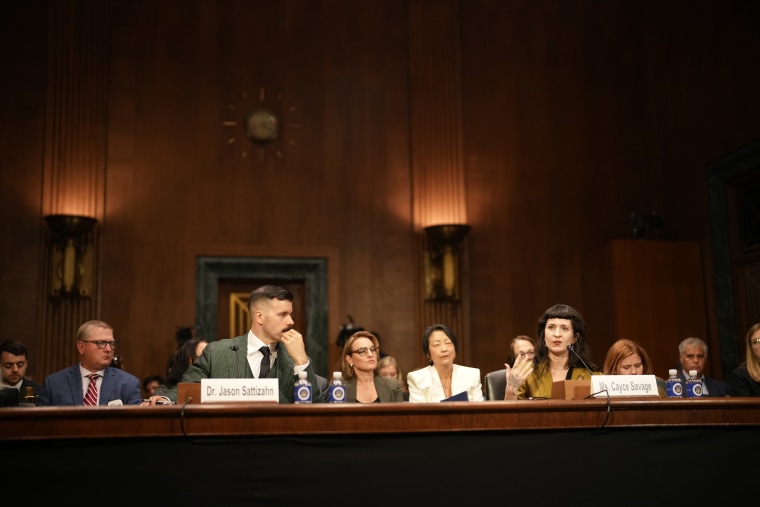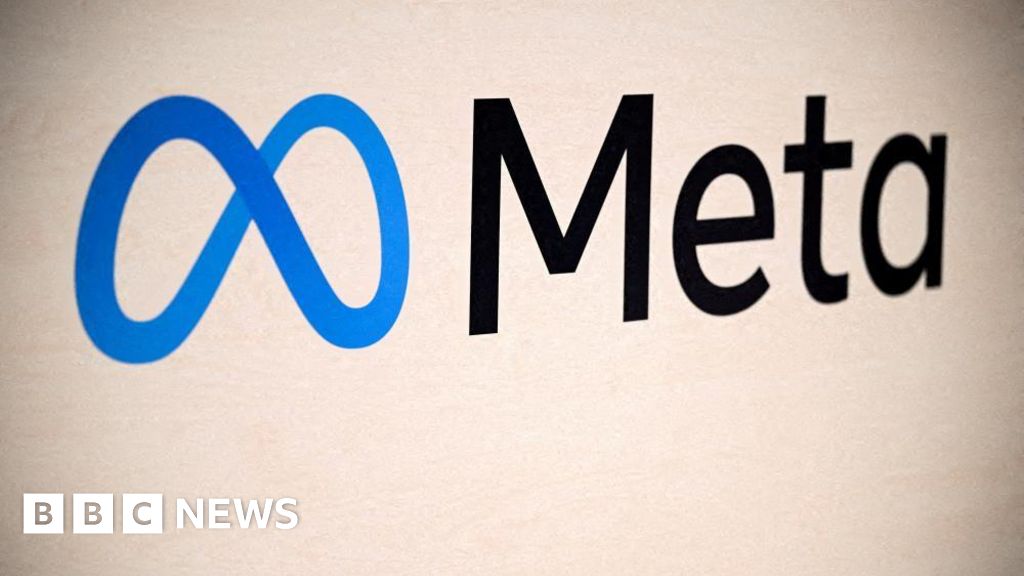Two former Meta employees alleged in sworn congressional testimony on Tuesday that the company’s virtual reality products have exposed children to adult content such as nudity, sexual propositions and live masturbation.
The former employees, Jason Sattizahn and Cayce Savage, worked as researchers who specialized in studying the welfare of underage users of Meta VR products. They told senators from the Senate Judiciary Subcommittee on Privacy, Technology and the Law that Meta disregarded their findings, censored their attempts to do further research and, in at least one instance, deleted evidence of a youth being sexually harassed.
Their testimony added to a yearslong controversy around CEO Mark Zuckerberg’s company and how minors are treated on his social media platforms, including Facebook and Instagram. Spurred by testimony from earlier whistleblowers and by news reports, lawmakers, class action lawyers and state attorneys general have been pushing for changes at Meta, as well as compensation for those who say they’ve been hurt.
Sattizahn and Savage both worked in various departments at Meta over several years before focusing on the topic of minors and virtual reality. Meta has poured billions of dollars into developing virtual reality spaces and the headsets used to access them, but the two former employees said Meta hasn’t devoted sufficient resources to online safety.
“Meta is aware that children are being harmed in VR,” Savage testified at the hearing.
“I quickly became aware,” she said, “that it is not uncommon for children in VR to experience bullying, sexual assault, to be solicited for nude photographs and sexual acts by pedophiles, and to be regularly exposed to mature content like gambling and violence, and to participate in adult experiences like strip clubs and watching pornography with strangers.”
Savage, who said she left Meta in 2023, said she was stymied when she wanted to find out how common the problems were.
“I wish I could tell you the percentage of children in VR experiencing these harms, but Meta would not allow me to conduct this research,” she said.
Sattizahn said that, according to his observations, some adults use Meta’s virtual reality products during masturbation in situations where minors can hear.
“The audio that’s transmitted isn’t just solicitation,” he said. “There will also be instances — that we have seen — where you can hear people sexually pleasuring themselves, transmitted over audio in a spatial sense, as you are being surrounded and brigaded and being harassed.”
Sattizahn said he was fired by Meta last year after he complained internally about limits placed on his research.
Meta disputed aspects of their testimony, saying they were being selective in talking about the company.
“The claims at the heart of this hearing are nonsense; they’re based on selectively leaked internal documents that were picked specifically to craft a false narrative,” Meta spokesperson Andy Stone said in a statement.
Stone also denied the allegations of internal censorship at the company, saying “there was never any blanket prohibition on conducting research with young people.” He said that, since 2022, Meta conducted “about three dozen studies on social issues related to young people and hundreds more on other youth-related matters.”
Zuckerberg has embraced virtual reality as part of Meta’s future — even rebranding his corporate umbrella from Facebook to Meta in 2021 in a nod to the metaverse. He has also invested billions of dollars into the development of VR headsets, eyeglasses and software starting in 2014, when he acquired VR headset maker Oculus for $2 billion.
But there have been long-standing concerns about the safety of kids who use virtual reality. Experts have documented various examples of sexual content, racism and abuse affecting children in the metaverse.

A 1998 federal law, known as the Children’s Online Privacy Protection Act, makes it difficult for internet companies to collect data about children younger than 13. But Sattizahn and Savage said that many children under 13 use Meta’s apps and that the company does not try hard to stop them in order to keep its user metrics high.
“Children drive profits,” Sattizahn said in an interview with NBC News after Tuesday’s hearing. “If Meta invests more in safety to get kids off of them, engagement goes down, monetization goes down, ad revenue goes down. They need them.”
He said he tells his own family not to use Meta apps and did so even while he was an employee.
Some of the allegations were first reported Monday by The Washington Post. The newspaper said that four current and former Meta staffers had gone to Congress as a group earlier this year to describe what they saw as corporate wrongs and provide internal documents.
Sattizahn and Savage are the latest in a long line of Meta and Facebook former employees to testify before Congress as whistleblowers, criticizing the company where they previously worked. The former employees include Frances Haugen, who testified in 2021 after releasing internal documents about teens’ suicidal thoughts and other subjects, and Sarah Wynn-Williams, who testified this year after writing a bestselling book about Facebook’s internal culture and its impact on democracy.
Sattizahn testified on Tuesday that, in the wake of earlier allegations, Meta has focused on damage control.
“Meta’s immediate response to congressional concern was not to do the right thing, but rather roll out new processes and policies to manipulate control and erase data,” he said. “We researchers were directed how to write reports to limit risk to Meta. Internal work groups were locked down, making it nearly impossible to share data and coordinate between teams to keep users safe.”
He told the senators in the hearing that when his team “uncovered that underage children using Meta VR in Germany were subject to demands for sex acts, nude photos and other acts that no child should ever be exposed to, Meta demanded that we erase any evidence of such dangers that we saw.”
Republican and Democratic lawmakers said they had lost patience with Meta and Zuckerberg.
The two witnesses, Sattizahn and Savage, “were hired to purportedly make the platform safer for children, but what they found was a company that knew their products were unsafe and they just did not care,” said Sen. Marsha Blackburn, R-Tenn., chair of the subcommittee.
Sen. Amy Klobuchar, D-Minn., said that Meta “blocked, manipulated, hid and deleted research that showed that its virtual reality products were frequently used by underage kids who were exposed to real and significant harm.”
Several senators said they wanted to see Congress pass legislation this year to try to hold tech companies accountable. Last year, the Senate passed a pair of bills aimed at protecting children online — including one that would impose a “duty of care” on internet companies — but those proposals stalled in the House, where Speaker Mike Johnson, R-La., said the bills implicated free speech.
Sen. Josh Hawley, R-Mo., who is running a separate investigation into how teens have used Meta’s AI chatbots, said during Tuesday’s hearing that he wants Americans to be able to sue tech companies more easily for alleged damages.
“We need to open the courtroom doors and allow victims to have their day in court,” he said.
In her testimony, Savage said most parents are not informed about the potential harm in virtual reality.
“A lot of parents in my research indicated that they weren’t aware that their children were interacting with strangers,” she said.
Source link

